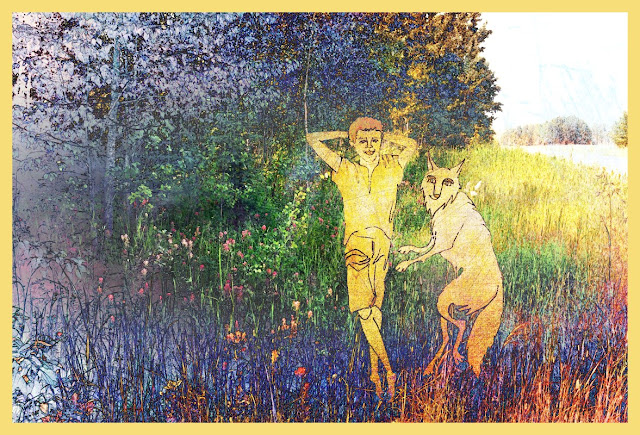Second short story in a series called "New Tales of the Old Forest". Sort of fairy tale adjacent, inspired by ancient cultures, you may encounter (over the series) Goddesses, talking animals, forest spirits, etc.
Long ago, when humans and other animals could still speak to each other, and often lived together, there was a boy and a coyote who were best friends. They sat together at lessons, did their chores together, played in the meadow or walked in the forest. And they laughed. They were always laughing, since they loved to tell jokes. The boy could always see a funny face or figure in the clouds, the mud or a piece of wood, and the coyote was very good at making up funny limericks, especially about anyone who thought too highly of themselves. When they’d joked and teased and tussled and laughed themselves to a sore belly, they might fall asleep in the shade of a big tree or in the meadow with grass and flowers and buzzing bees all around.
Certain of the other children were jealous, for no one had such a friendship as those two, and they wished the coyote would be their friend so they could laugh all day long. Some of these jealous children complained to their parents that the coyote did not spend time with them. There were parents who told their children not to worry about it, they should focus on the things they found interesting and valuable, and they would naturally form friendships with others who felt the same. Other parents, however, were angry that their children should be made to feel left out, and by someone not even human.
These offended humans grumbled to anyone who would listen, finding sympathetic ears among others who felt jealous of the beautiful fur or speed or cunning of the coyote people, or who simply did not like them because they were different. This talk even reached the ears of the parents of the boy who was friend with the coyote. They dismissed it as nonsense, saying “Every one of us is different, each with our talents, our weaknesses, our joys, our loves, our insecurities. Children must be taught to develop their own personalities without comparing to others.” But still, the complaining continued, and the anti-coyote sentiment grew. There were even those who said that coyotes should not live in the village with humans. The community became divided.
Finally, after resentment became hostility, there came a day when the coyotes felt they were no longer welcome, or even safe, to stay in the village. Early one morning, they had packed their things and prepared to leave while they’d have a full day’s light for walking. Some of the villagers were sad to see them go and came out to say goodbye. Others, embarrassed at having felt unable to defend the coyotes, remained in their houses. A few of those who’d been most vocal suggesting the village should be for humans alone, stood on their doorsteps with arms crossed, as if to say “Yes, it is time you were leaving!” Some were already eyeing the houses abandoned by those fleeing.
As the coyotes assembled, about to depart, more villagers emerged from their houses. These people were also packed and dressed for the journey, since they had no wish to live in the village as it had become, and they would go with their friends the coyotes.
The sun was just rising over the hills as the group began to trudge up the path away from the village, through the meadows and up into the forest. They were sombre with the occasion and early hour, still sleepy children held the hands of bigger folk, the smallest dozing in backpacks or riding on the loads on drag sleds.
As the group crested the hills that ringed the village’s valley, they came to a clearing bathed in the full morning sun, with a beautiful view of the land stretching away to the mountains in front of them. They stopped for water and snacks and the spirits of the group rose, as someone pointed out a hill in the distance where they could make their new home. When they set off again, the trail was now lively with chatting and laughing and young children and coyotes darting back and forth as their elders set a gentle pace. They boy and his coyote best friend were the happiest they’d been in ages, away now from the poisoned atmosphere of the divided village. Someone nearby called out for the coyote lad to share his jokes , so he sang out his rhymes in a clear voice, gently teasing the man who seemed to walk with his head on backwards as he watched his load anxiously ( the man laughed along and turned his head forward) or mocking the jays scolding them from the trailside, thinking they owned this land where any might pass.
The group became ever more happy in their decision to leave, and closer friends than ever. Feet and paws grew weary, little ones had to be carried, and all were grateful for a mid day rest under shady trees by a gentle river. Still as night began to fall and they set up camp, almost no one was homesick for the old village.
The coyotes began to sing a song of thanksgiving for their new home, with just a touch of sadness, and even the humans joined in. From that day they all lived happily in the woods and plains, avoiding most humans who could no longer see any of them as people and continue to see themselves ever more separate from the rest of the world. As for the coyote-people who moved away, you can still hear their songs of joy and sadness ringing across forest, field and meadow, awaiting the day when all humans recognise again their brotherhood with all living things.
END
And some bonus cover art!



















Comments
Post a Comment